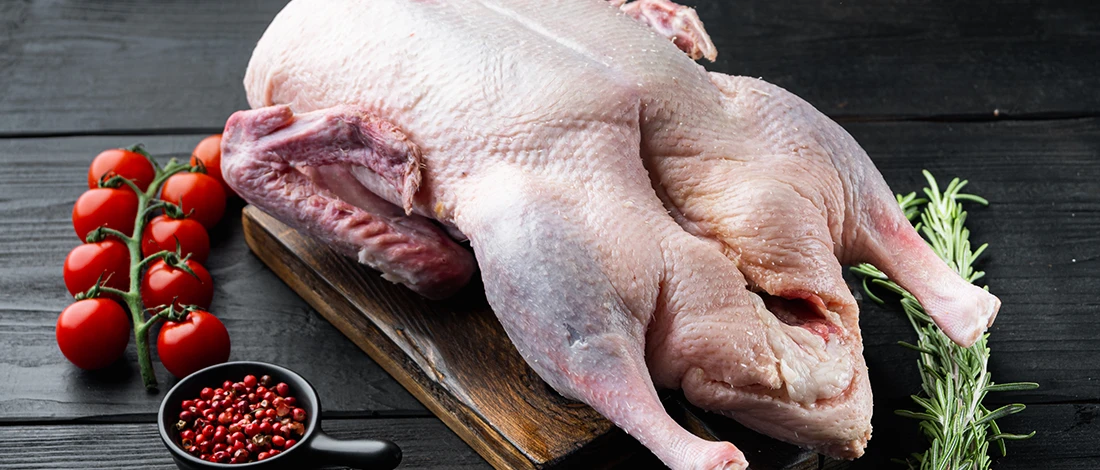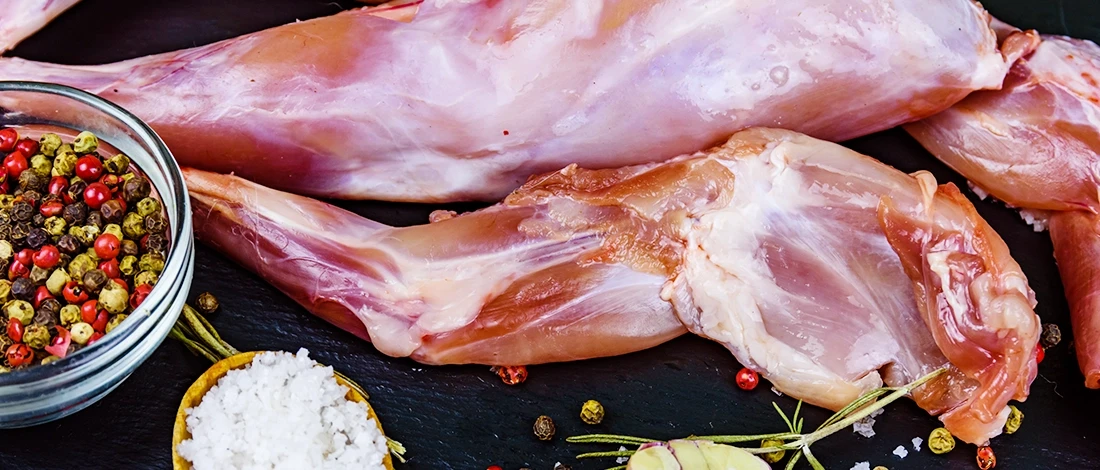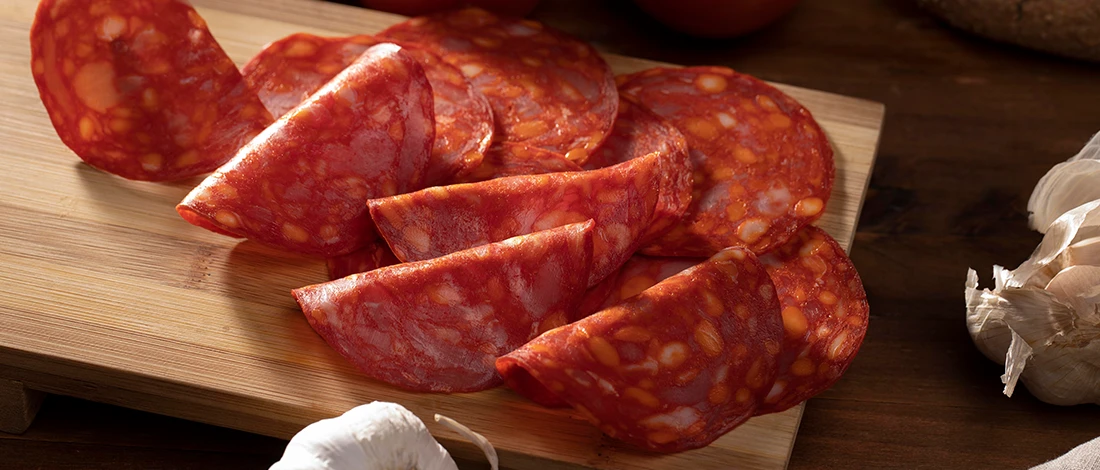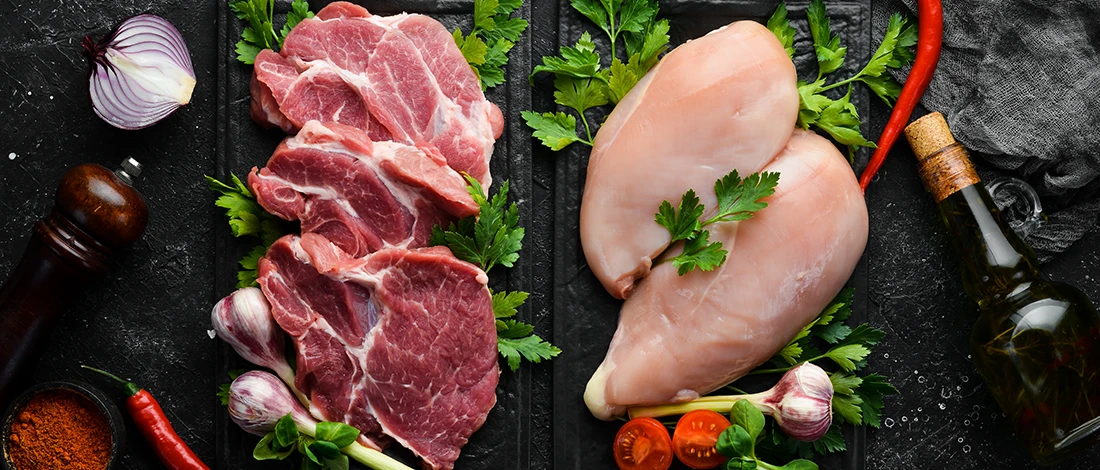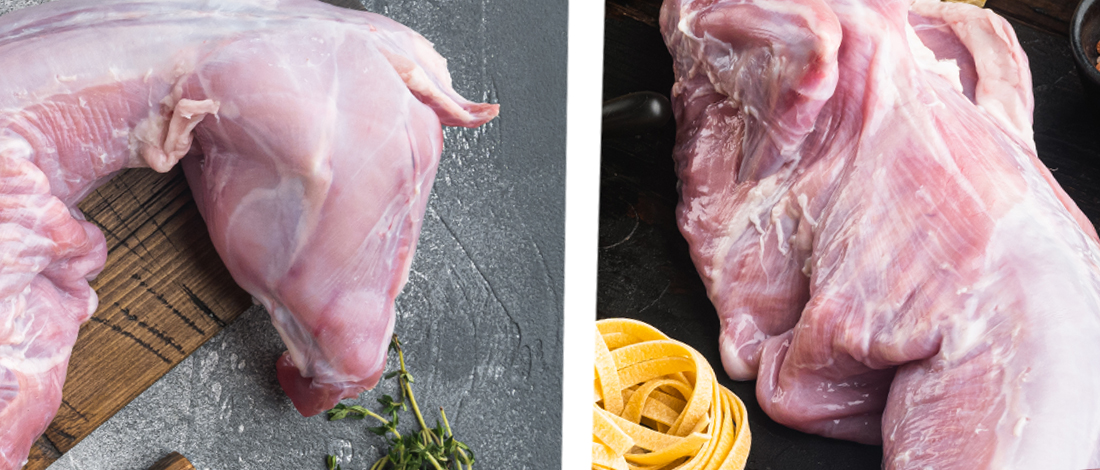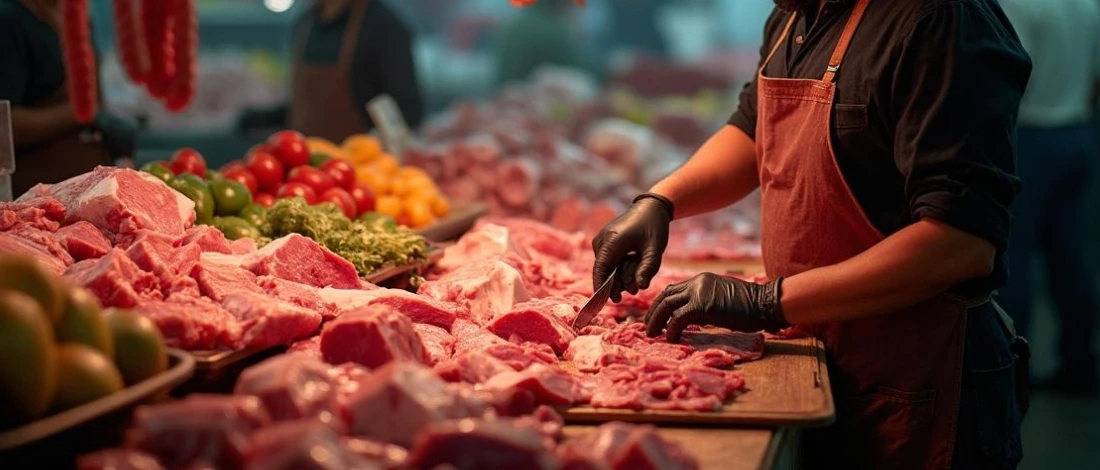Like most carnivore lifestyle followers, I’ve had chicken as a staple of my diet for a very long time. However, I am always looking for healthy alternatives, and rabbit meat is one that I have explored recently.
As an experienced nutrition enthusiast, I have researched the benefits of rabbit and chicken meat and compared their nutritional profiles.
Here’s what you need to know about the differences between these types of meat.
Quick Summary
- Compared to chicken meat, rabbit meat is still not widely available in grocery stores.
- Rabbit meat is gaining popularity among health-conscious individuals due to its leanness and nutrition.
- Rabbit's unique flavor and texture make it popular with adventurous cooks.
Rabbit vs. Chicken: General Differences and Characteristics
Let’s see how rabbit and chicken meat differ based on classification, availability, taste, usage, and storage.
1. Classification
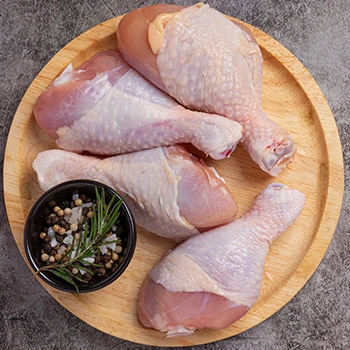
Chicken, like other poultry, is considered white meat by the U.S. Department of Agriculture (USDA) [1].
This is because chicken meat has a low concentration of slow-twitch muscles and a decreased hemoglobin content. These give chicken meat its characteristic light color.
The USDA classifies rabbits, like other four-legged mammals, as a type of red meat [2]. It has a higher content of iron and heme, making its flesh darker than chicken.
However, in culinary world usage, things are not so clear-cut. Indeed, many chefs and cookbooks consider both chicken and rabbit to be sources of white meat.
2. Price and Availability
Chicken meat is a common food source worldwide, with more than 33 billion chickens raised this year [3]. This means there are four times as many chickens as people on the globe.
In contrast, there are only just over 700 million domesticated rabbits worldwide [4]. Raising rabbits does happen on the scale of chickens because it is harder to care for and feed rabbits.
Given the wide disparity in numbers, it is unsurprising that chicken meat is easier to find than rabbit meat.
Every grocery store and local butcher carries chicken meat, while rabbit meat is much less common.
Additionally, given the prevalence of poultry consumption, chicken meat is a much cheaper option than rabbit meat.
Read More: Where to Buy Rabbit Meat?
3. Taste

Chicken, as we all know, tastes like chicken. This meat is known for its mild flavor, making it ideal for recipes that use strong ingredients or bold sauces.
Some people think rabbit meat tastes similar to chicken, but I think these two different animals have two different flavors.
Rabbit is considered to be meatier, earthier, and more flavorful despite it being low in fat. The gamier taste of rabbit will depend on the animal's age, breed, and what they ate.
The texture of both types of meat is similar as well, though rabbit meat is slightly leaner, making it a bit chewier if not properly cooked.
4. Usage
Because these meats are similar in taste and texture, they can be used interchangeably in many recipes. However, the different fat content between the two should be taken into account when cooking.
Start experimenting by swapping out boneless chicken breasts, wings, or thighs for some rabbit meat in some of your favorite dishes.
Rabbit's robust flavor and meaty texture will balance out some complex dishes like casseroles and curry.
5. Storage

Like any meat, chicken and rabbit have a short shelf life at room temperature. Thus, both should be refrigerated or frozen if not cooked immediately after purchase.
The USDA recommends storing chicken meat in the refrigerator at 40 degrees Fahrenheit for no longer than one to two days [5].
Both can be kept in a freezer indefinitely, though freshness and tastiness will vary depending on the packaging and storage conditions.
I recommend storing both types of meat in airtight containers for no more than nine months before using them.
Both chicken and rabbit meat do not have long shelf lives after thawing, so you should cook either animal quickly.
Nutritional Content of Rabbit and Chicken

One of the most important aspects of any meat is its nutritional value. When it comes to protein, both chicken meat and rabbit meat are excellent sources of healthy meat, but there are some differences that make rabbit meat healthier.
Chicken
Chicken meat has the following nutritional content in a 3-ounce serving:
- Calories: 200 calories
- Total Fat: 11 grams
- Saturated Fats: 3 grams
- Protein: 23 grams
- Carbohydrates: 0 grams
- Cholesterol: 75 mg
Chicken is also rich in B-complex vitamins, such as vitamins B2, B3, B5, and B6 [6].
Chicken meat contains more calories than rabbit and more cholesterol.
Rabbit
Rabbit has a nutrition profile that is a healthier option compared to chicken.
Three ounces of rabbit meat contains:
- Calories: 97 calories
- Total Fat: 1.9 grams
- Saturated Fat: 0.4 grams
- Protein: 19 grams
- Carbohydrates: 0 grams
- Cholesterol: 69 mg
Rabbit meat contains many vitamins and minerals. It is a healthy source of Vitamin B12, iron, zinc, and other trace minerals [7]. It also has less sodium than chicken breast and is rich in polyunsaturated fats compared to many red meats.
Rabbit meat has a higher calcium content than chicken meat contains and a higher concentration of phosphorus [8].
Health Impact of Rabbit Meat vs. Chicken Meat

Both chicken breast and rabbit meat are low-calorie, lean foods that are high in protein and other nutrients.
Here are some other important health considerations:
- Because most people eat chicken meat with the skin on, chicken has more calories and fat than a comparable serving of rabbit. However, skinless chicken meat is still a good choice for those looking to cut down on fat and calories.
- Rabbit is slightly lower in protein per serving than chicken but has no carbohydrates and is quite low in cholesterol. This makes rabbit meat an ideal protein source for people who are watching their fat or cholesterol levels.
- Both rabbit and chicken are good choices for a keto diet or other eating program designed to keep the glycemic index low and yield good cardiovascular health and muscle development.
- Although people are concerned about the health effects of too much red meat consumption, rabbit meat does not have the same fat content as chicken and other food. It is one of the leanest meats available and, with its vitamins and minerals, certainly has a place in a balanced diet.
- Although rabbit meat has many health benefits, you cannot have a diet that consists only of rabbits. Historically, doing so in certain diets resulted in a state of malnutrition known as "rabbit starvation," "mal de caribou," or "protein poisoning."
- This condition is misnamed, however. Protein poisoning is not so much due to the protein content of rabbit meat, but rather that rabbit is so very low in total fat. If you are using rabbit as the main part of a higher protein diet, you will need to add the good fats that all bodies require.
Reception
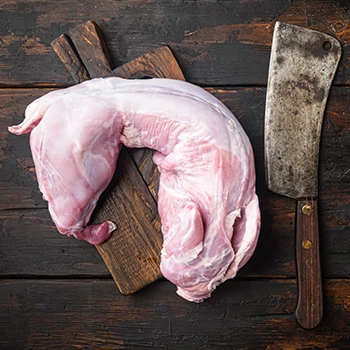
Given the health benefits of rabbit meat, as well as its unique flavor, there is a growing interest in this food as a more sustainable alternative to chicken meat.
In recent years, the demand for rabbits has increased steadily as people look for healthier meat. And farms are also popping up across the country to breed meat rabbits in response to demand.
However, many people are still hesitant about eating rabbit meat due to their unfamiliarity and misconceptions about eating wild game meat.
On top of that, it is difficult for American consumers to set aside the idea of rabbit meat from the picture of cute bunnies that are kept as pets.
"No matter how beautiful it is, a rabbit is still just a chunk of meat once you skin it."
- Kyōko Okazaki, Artist & Foodie
Related Articles:
FAQs
Why is Rabbit Not Farmed?
Rabbit is not farmed because rabbits are relatively fragile animals that are susceptible to disease, and many do not live long enough to make it cost-effective to cultivate them. In a factory farm setting, rabbits require antibiotics and special diets to remain healthy.
Why Can't You Live Off Rabbit Meat?
You can't live off rabbit meat alone because it is low in fat and other vital nutrients. The human body requires fats and other nutrients to thrive, and a diet that consists solely of rabbit will lead to malnutrition.
Does Rabbit Meat Taste Good?
Yes, rabbit meat tastes good and is often described as "mild-flavored" or "like chicken meat." It is gamier than chicken, but its delicate flavor can be enhanced with various seasonings.
What Is the Best Way to Eat Rabbit?
The best way to eat rabbit is in a rabbit stew. This traditional dish consists of rabbit meat simmered in a flavorful broth with carrots, celery, onions, and other vegetables. Rabbit can also be roasted, grilled, or fried.
References:
- https://fdc.nal.usda.gov/fdc-app.html#/food-details/174347/nutrients
- https://foodandnutrition.org/january-february-2013/color-confusion-identifying-red-meat-white-meat/
- https://www.statista.com/statistics/263962/number-of-chickens-worldwide-since-1990/
- https://nationaltoday.com/international-rabbit-day/
- https://ask.usda.gov/s/article/How-long-can-meat-and-poultry-be-stored-in-various-packaging
- https://www.fsis.usda.gov/sites/default/files/import/Chicken_Turkey_Nutrition_Facts.pdf
- https://fdc.nal.usda.gov/fdc-app.html#/food-details/174347/nutrients


